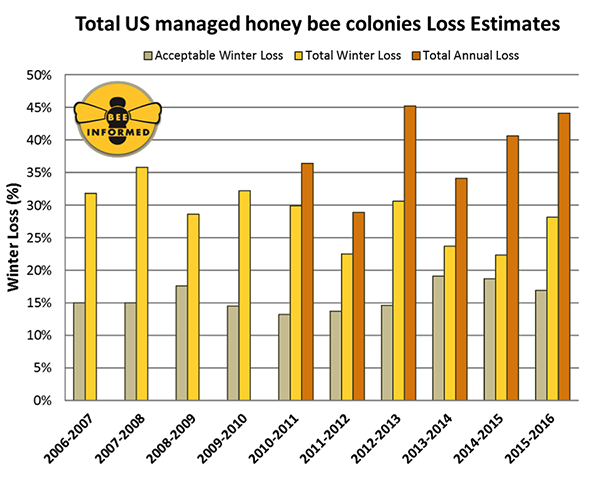America’s beekeepers, professionals and hobbyists, suffered a record year of colony deaths in the last year, a huge sting that eliminated 44 percent of the colonies, according to an annual survey released Tuesday.
The Bee Informed Partnership, with support from the Apiary Inspectors of America and the U.S. Department of Agriculture, said that for the second year in a row colony loss numbers were above 40 percent. The survey was from April 2015 to last month.

The survey found an unusual number of hive deaths occurring in the summer, when hives are at their peak, not just winter when the cold can kill colonies.
“We’re now in the second year of high rates of summer loss, which is cause for serious concern,” said Dennis van Engelsdorp, an assistant professor of entomology at the University of Maryland and project director for the Bee Informed Partnership. “Some winter losses are normal and expected. But the fact that beekeepers are losing bees in the summer, when bees should be at their healthiest, is quite alarming,” he said, according to the industry’s trade magazine Bee Culture.
Among the reasons for the kills was the deadly varroa mite the attaches itself to bees.
Bee Culture’s daily blog, “Catch the Buzz,” reported, “This is the tenth year of the winter loss survey, and the sixth year to include summer and annual losses in addition to winter loss data. More than 5,700 beekeepers from 48 states responded to this year’s survey. All told, these beekeepers are responsible for about 15 percent of the nation’s estimated 2.66 million managed honey bee colonies.”
Larissa Walker, pollinator program director at Center for Food Safety, said she was shocked.
“Bees, beekeepers and anyone who eats food are all impacted by severe declines in honey bee colonies – these consecutively high losses year after year are catastrophic to our food system,” she said. “Scientific studies continue to link uses of pesticides to bee kills and poor colony health. This year’s survey results should be a major wake up call for regulators who have failed to tackle issues with toxic pesticides head-on. The longer the government waits to take action, the more bees and beekeepers will continue to suffer.”
On Wednesday, the Agriculture Department will release its review of hives in the nation.
Paul Bedard, the Washington Examiner’s “Washington Secrets” columnist, can be contacted at [email protected]

